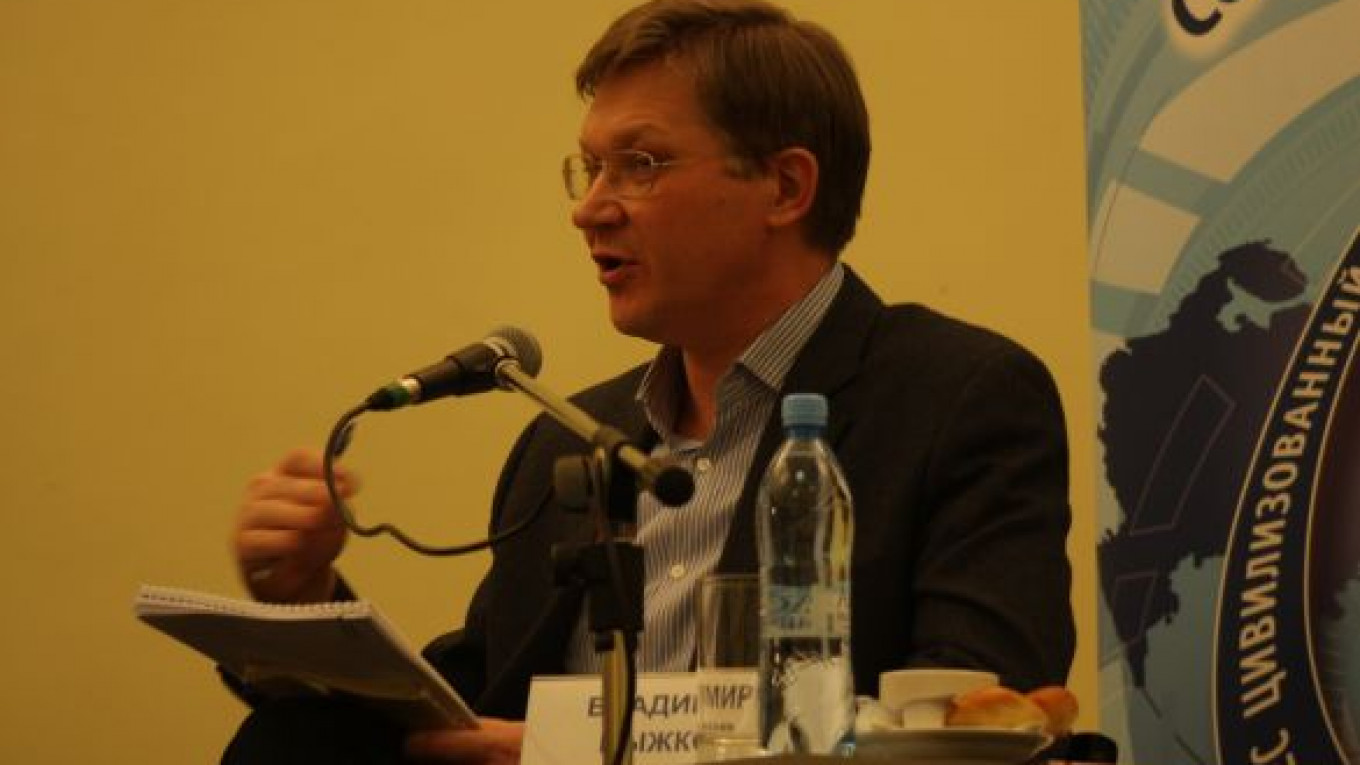As Moscow braces itself for this weekend's street demonstration against disputed December elections, Russian businessmen on Wednesday expressed their disquiet with the protest movement and the goals articulated by its leaders.
During a debate hosted by the lobby group Delovaya Rossia — which represents the interests of businesses outside the energy sector — its chairman Boris Titov urged restraint and criticized naive demands, dubious leaders and unrealizable aspirations.
Though a founding member of Prime Minister Vladimir Putin's All-Russia People's Front, Titov has consistently espoused the need for deep institutional reform. He is a member of the Right Cause political party and owner of the Russian champagne manufacturer Abrau-Dyurso.
The business community was concerned, Titov said, by the opaque slogans of protesters who on Dec. 10 and Dec. 24 succeeded in staging the biggest rallies Russia has seen for 20 years. He added that the leaders of the movement should be more pragmatic and wary of ushering in a period of chaos.
"The most important point is that citizen activism should not lead to political instability, which would be a very negative scenario," he said. "Dialogue [is needed] on the basis of reason and intelligence and not of emotion and political ambition."
He was speaking as part of a debate staged by Delovaya Rossia's Stolypin Club between Titov and opposition leader Vladimir Ryzhkov, who is one of the 17 members of a committee organizing the Feb. 4 protest. Pyotr Stolypin, for whom Putin's admiration is well known, was prime minister under Tsar Nicholas II and famous for his ruthless suppression of popular revolt and program of political reform.
Ryzhkov said the four main demands of protesters were both realistic and achievable. The demands are: the release of all political prisoners; the annulment of December's State Duma elections and new elections; a criminal investigation into electoral fraud and the dismissal of Central Elections Commission head Vladimir Churov; and new legislation easing the registration of political parties.
Although he supported the call for Churov to step down, Titov said the other points were too radical to ever be taken seriously. "Why give the authorities the sort of demands that [you know] in advance they will not agree with?"
Delovaya Rossia has instead proposed a six-point Businessman's Charter for Responsible Elections that includes calls for electoral reform, new Duma elections before December 2013 and a gradual transition to the direct election of regional governors.
"It's not worth rushing into political liberalization," Titov said. "It's necessary to think everything through and allow conditions to mature."
He also disputed Ryzhkov's assertions about the size and reliability of Russia's middle class. Ryzhkov, who was a Duma deputy between 1993 and 2007, said 60 percent of Moscow's population was middle class and "will not head toward blood and violence."
But Titov put Russia's middle class at no more than 15 percent and said it was actually shrinking. He excluded from this calculation bureaucrats who, he said, have no genuine interest in democracy.
There are few hard economic facts to support any thesis that the political upheaval since Putin announced his desire to run for a third term as president in September has negatively affected Russia's economy. Ryzhkov cited the $33.6 billion spike in capital outflow in the fourth quarter as proof of such a thesis, but many economists disagree.
Sberbank's head analyst Ksenia Udayeva said Wednesday that large capital outflows were more linked to the different interest rates on credit in Russia and abroad.
But the exchange of ideas between Ryzhkov and Titov appears to reflect a growing awareness on the part of the protest leaders that they must reach out to the business community to be taken seriously.
On Monday evening, blogger and opposition darling Alexei Navalny met a group of investment bankers at an elite Moscow club to present his political views. Renaissance Capital's chief economist Ivan Tchakarov said in a note to investors the following day that Russia's "possible future president" was at pains to reassure the bankers and investors present that they need not be afraid of protesters.
Ryzhkov also sought to allay the concerns of the business community. Protesters represent "the flower of society," he said, and 83 percent of those who attended the rally on Prospekt Sakharova on Dec. 24 had higher education.
"We are against revolution, and we are against violence," Ryzhkov said.
A Message from The Moscow Times:
Dear readers,
We are facing unprecedented challenges. Russia's Prosecutor General's Office has designated The Moscow Times as an "undesirable" organization, criminalizing our work and putting our staff at risk of prosecution. This follows our earlier unjust labeling as a "foreign agent."
These actions are direct attempts to silence independent journalism in Russia. The authorities claim our work "discredits the decisions of the Russian leadership." We see things differently: we strive to provide accurate, unbiased reporting on Russia.
We, the journalists of The Moscow Times, refuse to be silenced. But to continue our work, we need your help.
Your support, no matter how small, makes a world of difference. If you can, please support us monthly starting from just $2. It's quick to set up, and every contribution makes a significant impact.
By supporting The Moscow Times, you're defending open, independent journalism in the face of repression. Thank you for standing with us.
Remind me later.







